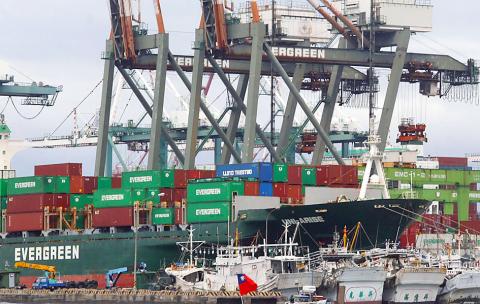The nation’s exports last month fell 4.8 percent from a year earlier to US$27.72 billion, extending April’s 3.3 percent decline, as escalating US-China trade tensions cooled demand for most products and soured outlooks, the Ministry of Finance said yesterday.
“Firms have misgivings about doing business as uncertainty increases,” Department of Statistics Director-General Beatrice Tsai (蔡美娜) said.
It is the seventh straight month that the critical economic gauge posted a negative cyclical movement without any sign of improvement, Tsai added.

Photo: CNA
The Directorate-General of Budget, Accounting and Statistics last month projected that exports might remain negative for the rest of the year, rather than posting fractional growth as previously forecast.
Non-technology sectors were hardest hit as shipments of base metal products shrank 20 percent, chemical products 19.3 percent and plastic products 14 percent from levels last year, Tsai said.
The retreat is the fastest in three years, exacerbated by falling prices for raw materials and base metals, as firms hesitate over building inventories, she said.
Weak sentiment also caused shipments of machinery products to contract 12.8 percent, optical products 8.8 percent and electrical products 5.5 percent, a ministry report said.
Bucking the downturn were chipsets with a 4.4 percent increase, and information and communications products with a 22.9 percent increase, it said.
“China’s Huawei Technologies Co (華為) reportedly made purchases to manage an imminent supply crunch following Washington’s trade restrictions on the company,” Tsai said.
Imports contracted 5.9 percent last month to US$23.22 billion, allowing Taiwan to achieve a trade surplus of US$4.49 billion, the report said.
Sluggish imports came after purchases of capital equipment fell 7.4 percent to US$3.48 billion, ending five consecutive months of gains, Tsai said.
Volatile economic conditions make local companies cautious, she said.
“Exports to China dropped 6.9 percent to US$11.03 billion, as some Taiwanese companies cut dependence on the market as a manufacturing base and moved production lines back home,” Tsai said.
Shipments to the US increased 8.6 percent to US$393.7 billion, raising its share of total shipments to a record 14.2 percent thanks to the relocation of production facilities, she said.
Uncertainty weakened exports to Europe by 8 percent and ASEAN markets by 11.2 percent, the ministry said.
“Looking ahead, declines in outbound shipments this month might be 2 to 4.5 percent,” Tsai said.
For the first five months of the year, declines in exports averaged 4.2 percent, while imports fared better, dropping only 1.2 percent, the ministry said.

SEMICONDUCTORS: The German laser and plasma generator company will expand its local services as its specialized offerings support Taiwan’s semiconductor industries Trumpf SE + Co KG, a global leader in supplying laser technology and plasma generators used in chip production, is expanding its investments in Taiwan in an effort to deeply integrate into the global semiconductor supply chain in the pursuit of growth. The company, headquartered in Ditzingen, Germany, has invested significantly in a newly inaugurated regional technical center for plasma generators in Taoyuan, its latest expansion in Taiwan after being engaged in various industries for more than 25 years. The center, the first of its kind Trumpf built outside Germany, aims to serve customers from Taiwan, Japan, Southeast Asia and South Korea,

Gasoline and diesel prices at domestic fuel stations are to fall NT$0.2 per liter this week, down for a second consecutive week, CPC Corp, Taiwan (台灣中油) and Formosa Petrochemical Corp (台塑石化) announced yesterday. Effective today, gasoline prices at CPC and Formosa stations are to drop to NT$26.4, NT$27.9 and NT$29.9 per liter for 92, 95 and 98-octane unleaded gasoline respectively, the companies said in separate statements. The price of premium diesel is to fall to NT$24.8 per liter at CPC stations and NT$24.6 at Formosa pumps, they said. The price adjustments came even as international crude oil prices rose last week, as traders

Taiwan Semiconductor Manufacturing Co (TSMC, 台積電), which supplies advanced chips to Nvidia Corp and Apple Inc, yesterday reported NT$1.046 trillion (US$33.1 billion) in revenue for last quarter, driven by constantly strong demand for artificial intelligence (AI) chips, falling in the upper end of its forecast. Based on TSMC’s financial guidance, revenue would expand about 22 percent sequentially to the range from US$32.2 billion to US$33.4 billion during the final quarter of 2024, it told investors in October last year. Last year in total, revenue jumped 31.61 percent to NT$3.81 trillion, compared with NT$2.89 trillion generated in the year before, according to

PRECEDENTED TIMES: In news that surely does not shock, AI and tech exports drove a banner for exports last year as Taiwan’s economic growth experienced a flood tide Taiwan’s exports delivered a blockbuster finish to last year with last month’s shipments rising at the second-highest pace on record as demand for artificial intelligence (AI) hardware and advanced computing remained strong, the Ministry of Finance said yesterday. Exports surged 43.4 percent from a year earlier to US$62.48 billion last month, extending growth to 26 consecutive months. Imports climbed 14.9 percent to US$43.04 billion, the second-highest monthly level historically, resulting in a trade surplus of US$19.43 billion — more than double that of the year before. Department of Statistics Director-General Beatrice Tsai (蔡美娜) described the performance as “surprisingly outstanding,” forecasting export growth